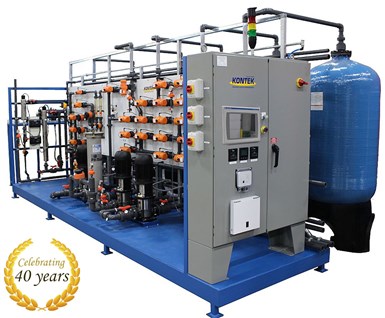Kontek Ion Exchange Systems Deionize Water for Recycling
The Rekon's applications include raw water purification, softening and deionization, wastewater recovery and recycling, polishing and targeted ion recovery.

Kontek’s Rekon ion exchange systems are designed to be a cost-effective method of removing dissolved heavy metals and salts from wastewater, producing high-quality deionized water for recycling. Applications include raw water purification, softening and deionization, wastewater recovery and recycling, polishing and targeted ion recovery. With a 24/7 operation capability, users can recover and recycle as much as 95% of their wastewater while consistently achieving compliant discharge levels, Kontek says.
Kontek Process Water Management|877-332-8366|kontekecology.com
Related Content
-
Plating, Anodizing Equipment for Variety of Applications
Titan Metal Fabricators Titan Metal Fabricators, Rightech Fabrications and Optimum Anode Technologies are leading suppliers of equipment for the plating and anodizing industries.
-
Looking to the Future of Finishing
Products Finishing takes a look at some of the ways the finishing industry is investing in workforce development and educational initiatives.
-
SUR/FIN 2023 Registration Is Now Open
The National Association for Surface Finishing SUR/FIN 2023 surface finishing industry trade show will take place June 6-8, 2023 in Cleveland, Ohio.







.jpg;maxWidth=300;quality=90)




